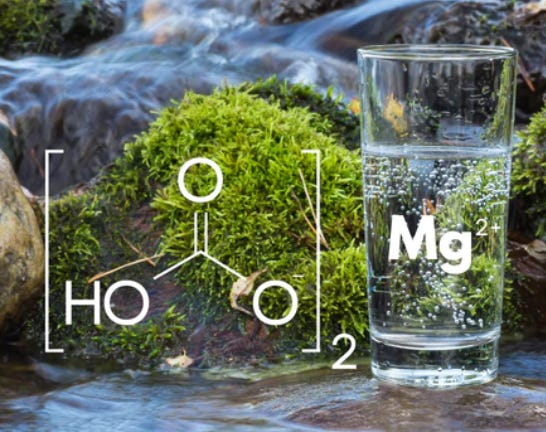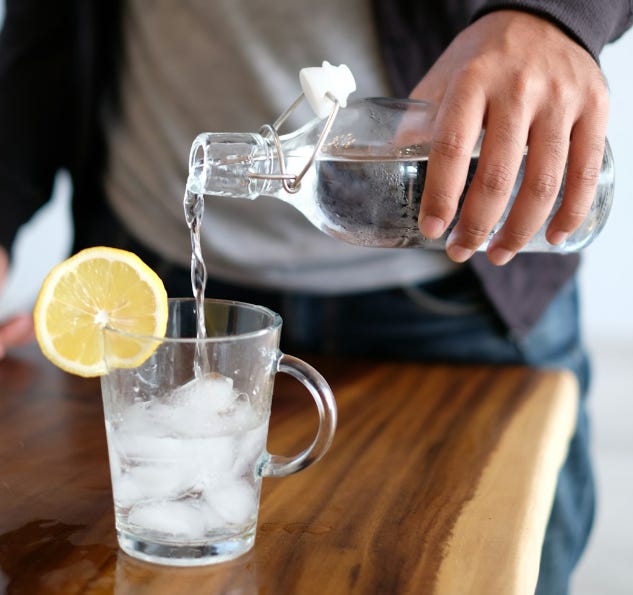If you’re deeply invested in achieving optimal bodily pH levels, this article is an invaluable resource that I’m thrilled to share with you. It delves into the critical importance of maintaining a balanced pH within your body. It's also a testament to the power of informed choice, making it an essential read for anyone committed to living a healthier life.
========
Magnesium is an essential mineral for your body. Unfortunately you won’t notice you’re lacking it until you feel the effects everywhere in your life. From your ability to sleep well to your mood to muscle cramps to hydration to cellular function, magnesium does it all.
How do you know if you’re low in magnesium? Some common signs include:
Fatigue
Muscle cramps or spasms
Muscle weakness
Numbness
Abnormal eye movements
And more
The World Health Organization says about 75% of the U.S adult population doesn't meet the RDA magnesium standards, which are at a mere 420mg. That’s a nutritional crime considering magnesium is a cofactor in more than 300 enzyme systems regulating many biochemical reactions in the body. It’s absorbed in the bloodstream via the small intestine, with about 60% of it incorporated within the bones, a little over 25% is contained within the muscles, and what's left is found in soft tissue and body fluids.
Within our diet, we can receive magnesium from green plants and animal foods, legumes, nuts, seeds, and whole grains. But because foods are processed so heavily today, we can’t count on receiving what we need, and even of that, only approximately 30% to 40% of dietary magnesium consumed is typically absorbed by the body.
Think about that statement. We need magnesium for over 300 bodily functions, yet most people are lacking in it. So what happens?

Many people turn to magnesium supplements to account for this loss, though all of these are unnatural. In nature, we never come in contact with magnesium chloride, sulfate, citrate, aspartate, oxide, carbonate, glutamate, threonate, amino acid chelate, orotate, lactate, glycinate, malate, or taurate. These magnesium (supplements) are fairly low in elemental magnesium (with Oxide highest at 60%), don’t dissolve well and are therefore poorly bioavailable in gut absorption.
What Is Magnesium Bicarbonate?
A much better and absorbable form is magnesium bicarbonate. Traditionally this variety used to be obtained from natural water sources (springs, wells, rivers, lakes, and aquifers). In nature, it is created by the reaction between Magnesium hydroxide, and atmospheric carbon dioxide and would naturally make its way into the water systems by runoff from the mineral Brucite, which is found in different rocks, marbles, and stones.
However, due to acidic industrial pollution and other environmental poisons that neutralize bicarbonate molecules, we’ve lost access to these natural magnesium sources in our waters. And adding insult to injury, we consume chemically sterilized recycled water, which includes substances like chlorine, chloramine, sodium fluoride, and hydrofluorosilicic acid, further diminishing access to natural magnesium sources. (Lifeblud.co)

That’s why I’m excited about magnesium bicarbonate. It’s made by mixing a highly stable, cheap and safe inorganic powder called Magnesium Hydroxide with seltzer water (containing carbon dioxide), to end up with Magnesium Bicarbonate. It’s a simple process that makes a magnesium alkaline liquid with a pH of 8.3
The greatest factor for neutralizing acidic waste in the human body is the availability of bicarbonates. Magnesium bicarbonate water supplies these bicarbonates along with necessary magnesium, while maintaining a strict pH balance.
Here are some key ways Magnesium Bicarbonate improves health:
Neutralization of toxins
May reverse osteoporosis
Prevents cardiovascular disease
Regulates high blood pressure
Treats diabetes by controlling blood glucose levels
Treats migraines, insomnia and depression
Correction of overly acidic conditions within the body
Protection from heavy metals
Oxygenation of blood
Brings about pH balance in the body
Enhances digestion and metabolism
Regulates blood glucose levels
Improves heart health
Supports the nervous system and muscle function
Prevents kidney stones
Relieves chronic stress and migraines
Regulates electrolyte balance
How To Make Magnesium Bicarbonate
By mixing Magnesium Hydroxide into cold, carbonated water, we can create Magnesium Bicarbonate, offering a viable alternative to commercial magnesium supplements, which often have low absorption rates.
The Process:
1. Get 1 liter of regular Seltzer Water (refrigerated, cold)
2. Weigh out 3.6 grams of Magnesium Hydroxide. (About 1 teaspoon if scale not available)
3. Without shaking the bottle, gently open it. Quickly pour in the Magnesium Hydroxide. Quickly close and shake bottle thoroughly.
4. Place bottle in fridge for 30 mins for the Magnesium Hydroxide to react with the CO2 in the seltzer.
5. Take it out after 30 mins and shake one last time. Let it settle in the fridge for another 30 mins and it's ready for consumption.
The Magnesium Hydroxide reacts with the CO2 in the seltzer and creates Magnesium Bicarbonate. If in the mixture you’re using too much Magnesium Hydroxide, you’ll see white sediments at the bottom of the bottle (un-reacted Magnesium Hydroxide). You can always adjust your dose next time or use another brand of Soda/Seltzer. Some brands carbonate more and thus more Magnesium Hydroxide can be used. Not to worry if you put in too much and you see white sediment at the bottom, it is not bad for you - it just creates a laxative effect.
Supercharge The Mixture
If you want to make the mixture into an even more potent electrolyte , then supplies are certainly cheap and making it is easy as well:
1pinch aluminum-free sodium bicarbonate (baking soda) - works as a vehicle to get magnesium into the mitochondria.
1 pinch of potassium carbonate - works with sodium bicarbonate to regulate the body's water balance. Nerve and muscle functions suffer when sodium and potassium levels are off. Potassium also sends oxygen to the brain and to the mitochondria to make ATP's.
1/2 tsp magnesium hydroxide - Magnesium helps potassium and calcium travel across cell membranes. Low magnesium causes low potassium.
1 pinch of calcium carbonate - Calcium and magnesium work together. They bind at the same sites in the body. The higher the level of magnesium, the greater the need for calcium. Low levels of magnesium cause calcium build up.
1 liter of regular Seltzer Water - (Keep the water in the refrigerator at least 12 hours prior to starting this recipe.)
Directions:
Open carbonated water bottle and add potassium, close lid tightly right away to not let the carbonation out. Shake the bottle.
Open bottle again, and add the calcium, close and shake, repeat the process with the rest of the ingredients.
Keep it sealed in the fridge until water becomes clear.
When the liquid clears, (typically within another 20-30 minutes) the magnesium hydroxide should have reacted with the CO2 to become concentrated magnesium bicarbonate water with approximately 1500 mg of magnesium and approximately 7500 mg of bicarbonate.
Depending on the source of water used for dilution, the pH will end up being between 8.0 and 8.5.
Don’t drink this mixture straight from the bottle, or drink too much of it daily, because it may cause intestinal discomfort, diarrhea, cramping, electrolyte imbalance, and even lead to magnesium toxicity. You also don’t want to make your body too alkaline, so create a diluted solution by adding small amounts to your water or drinks - 1/2 to 3/4 of a cup and drink throughout the day.
Your magnesium bicarbonate needs to stay refrigerated to stay active and you should drink it within a few weeks to not have it lose potency.
Break usage into 2 doses - one first thing in the morning (or even when you get up at night to go to the bathroom if your morning is rushed) – then later in the day before a meal or before bed, and always on an empty stomach. If you take the magnesium bicarbonate water with food, the bicarbonates will be neutralized (and of little therapeutic value) by the stomach acid that is produced when food is ingested.
Now you’re ready to drink water rich in magnesium bicarbonates – replenishing the bicarbonates in the blood and helping your body continuously rid itself of new and stored acidic wastes. I’ve put in a link to a company in the US that carries the product and their price is cheap. You can also get it in Canada here.
Magnesium bicarbonate stands out as a versatile and beneficial supplement that enhances bicarbonate reserves, stabilizes the structure of the water, and supplies much needed magnesium in a biologically available form to the body. As such, it’s not just a supplement, but a cornerstone of maintaining a balanced and healthy body.
This video below on the benefits of Magnesium Bicarbonate is worth watching:
If you like what you read, please click the like button or leave a comment. it helps to spread and expose this article to others. Thanks.





My pleasure. If I can help others, I'm happy.
Hi Jorg, all I can see at the amazon link you provided is magnesium chloride or magnesium oxide in pill forms. If I cannot find hydroxide would you recommend another form? Or is it not the same? Thanks.